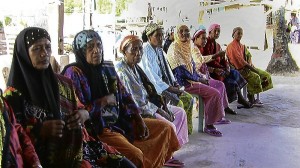
THE WOMEN of Tigtabon, like most women in conflict areas, often stay in the background but play key roles in projects that would improve lives and make a difference in their village, one of the remotest areas in Zamboanga City. JULIE ALIPALA
BASILAN—Using crisp-new fabrics, 55-year-old Sabing Muhammad and her elder sister, Jumaira Salili, wrapped four big pots filled with special delicacies.
Muhammad, her three daughters and a niece brought the freshly cooked rice “jatih” (yellow steamed rice wrapped in huge jatih leaves), “piyanggang” (spicy chicken in coconut milk), “bauluh” (small muffins) and “tiyulah itum” (black soup beef) to the house of Minang Bakil.
The dishes, meant to be “magsampul” or peace offerings, were received by Bakil, her daughters and other female relatives. These were to be served later to the male members of her household.
With the glorious food treat, Muhammad and Bakil met in the presence of a “Babuh Dayang” (woman healer), and talked about how to bring together their husbands and other male members of their families to settle their bloody feud peacefully with the help of an imam, a Muslim religious leader.
Both parties agreed to follow the conditions (blood money and valuables) defined by the menfolk.
Game brawl
In an interview with the Inquirer last month, Muhammad and Bakil recalled how their settlement came about two years ago.
The hostilities originated from a simple volleyball game that led to a brawl involving the sons of the two women.
“My 15-year-old son Benjie died due to internal bleeding,” Bakil said.
A month after, Muhammad lost her 18-year-old son Jasser. “He was going home from the neighbor’s when he was stabbed to death,” she said.
Both mothers were shaken by the deaths, but instead of tolerating the animosity between their families, they decided to find ways to end it. “Otherwise, we would keep on fighting until no one is left on both sides,” Bakil said.
In most conflicts between two families, “it’s the women who initiate the ‘pagmisuarat’ or dialogue to find ways for a peaceful settlement,” according to Prof. Alih Sakaluran Aiyub of Western Mindanao State University.
Low profile
Aiyub said the initial effort is “usually done low-profile, with the women working behind the scenes.”
“The identities of those who initiated the first steps are not really known to everyone. The idea there is the purity of their intention, not to show off,” he said.
Both Muhammad and Bakil refused to be photographed during the interview. For them, it is best to keep everything as a story that can be shared with others.
Bakil stressed that the Babuh Dayang’s identity should be kept secret, “otherwise, she can no longer perform effectively whenever there is another problem in the community.”
Sitti Djalia Turabin-Hataman, the executive director of the National Commission on Muslim Filipinos (NCMF) and president of the Pinay Kilos (PINK), confirmed the two women’s way of “behind-the-scenes legwork.”
Women’s image
“Women are actually the front-liners in negotiations as they are perceived to be excused from violence. Therefore, it is safer for them to get to the other party. Harming women is considered a dishonorable and disgraceful act between warring clans,” Hataman said.
“Women are believed to accomplish more in negotiations as they are more cool-headed and patient, and are more inclined to listen to each other,” she added.
Moreover, women bringing food, cloth, jewelry or money symbolizes sincerity in striking peace.
“Food is sacred among Muslims. Every food that is delivered is specially prepared. It is considered grace from the Almighty Allah, and to refuse it is deemed refusing Allah’s grace,” Hataman said.
Men take over
“Bringing food is a guarantee that they will not be rejected. Other items such as cloth, jewelry or money symbolize sincerity in the intention to negotiate for peace,” she explained.
After clearing the way and setting the environment necessary for a violence-free negotiation, the women take backseat roles and allow the men to take over.
“This is also partly because they believe it is the men who will be implementing the terms agreed in the negotiation, so having them discuss these terms provides credibility and assurance of compliance,” Hataman said.